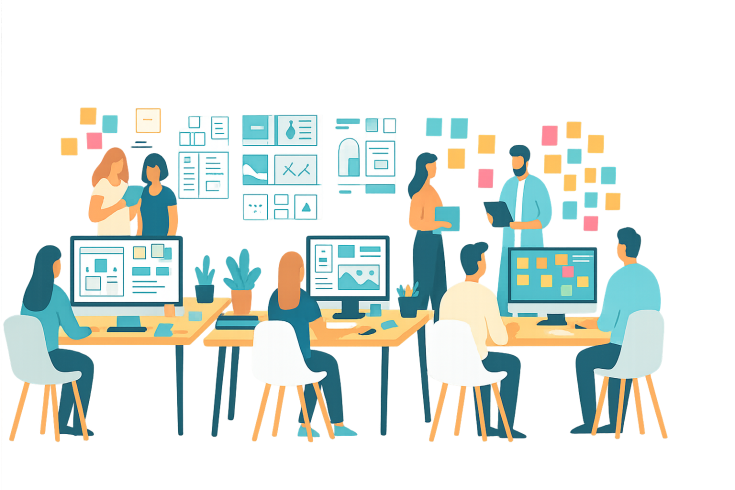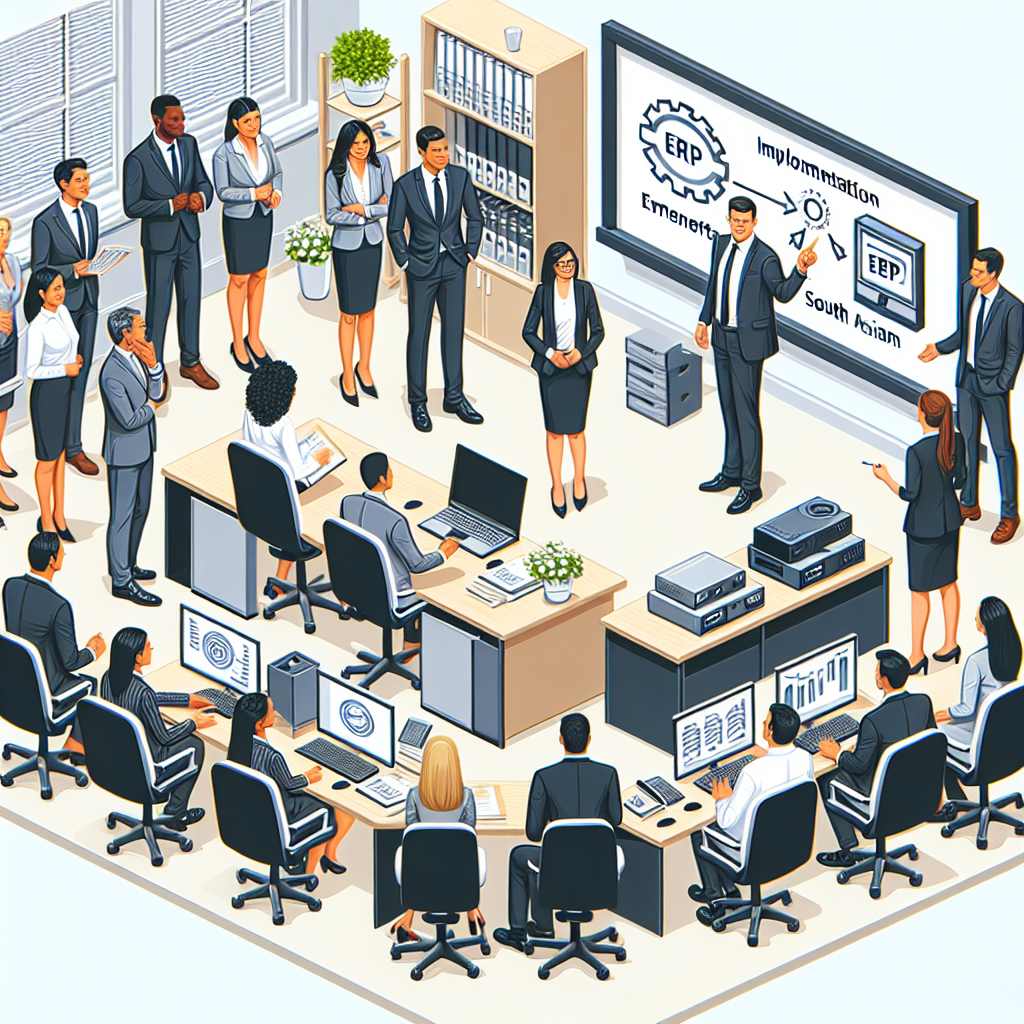Expert Development of ERP Systems for Enhanced Enterprise Management

How the Creation of an ERP System Can Transform Your Business Operations

Are you struggling to keep all the pieces of your business together? If so, youre not alone. Many businesses face challenges in managing diverse processes ranging from finance to production. Thats where the creation of an ERP system steps in to change the game! ⭐
Understanding ERP Systems
An ERP enterprise management system integrates all facets of an operation, including development, manufacturing, sales, and marketing. This means all departments can share information effortlessly, leading to improved efficiency and productivity. In fact, companies that implemented ERP saw an average productivity increase of about 25% within the first year! ⭐
Real Stories of Transformation
Take the example of a medium-sized manufacturing company that struggled with inventory management. They had multiple systems across departments, which often resulted in stock discrepancies and lost sales. After developing a tailored ERP system with our team at nexrilo.com, they managed to streamline their operations. This resulted in a 40% reduction in excess inventory and an increase in customer satisfaction ratings. Who wouldn’t want such results?
Customers like you share how our development of an ERP system reshaped their business landscape. Here are some features and benefits they reported:
- ⭐ Improved data accessibility across departments.
- ⭐ Faster order processing times.
- ⭐ Better reporting abilities for informed decision-making.
- ⭐ Significant cost reductions through efficiency.
Why Choose Our Process?
At nexrilo.com, we offer a unique approach to the development of an ERP system. As the only company in the country to provide a full spectrum of IT services, we ensure that you won’t have to juggle between different vendors. With 20 years of experience and a team of professional specialists, weve successfully crafted scalable solutions tailored to your specific needs.
Statistical Insights
According to research, implementing an ERP system can potentially reduce operational costs by up to 20%. These systems are particularly effective in enhancing reporting and planning. Additionally, 90% of users feel that an ERP system is crucial for long-term sustainability in their businesses. Are you ready to join this movement?
Key Features of Our ERP Solutions
| Feature | Description |
|---|---|
| ⭐ Centralized Database | All departments get real-time access to the same database, reducing errors. |
| ⭐ Analytics Tools | Advanced reporting tools to boost decision-making. |
| ⭐ Automation | Automate repetitive tasks to save time and enhance productivity. |
| ⭐️ Security Features | Robust security measures to protect sensitive information. |
| ⭐ Customization | Tailored functionalities to meet your unique business needs. |
| ⭐ Scalability | Easily adapt and grow with your business needs. |
| ⭐ Integration Capabilities | Seamlessly connect with other software applications. |
| ⭐ User Training | Comprehensive training programs to get your team up to speed. |
| ⭐ Technical Support | Ongoing maintenance and support to ensure smooth operations. |
| ✅ Performance Monitoring | Analyze and track your performance metrics effectively. |
Expert Advice: Implementing Your ERP System
Are you considering diving into the world of ERP? Here are some tips from our experts at nexrilo.com:
- ⭐️ Define your goals clearly before implementation.
- ✍️ Get your employees involved in the planning process.
- ⭐ Make data security a top priority.
- ⭐ Always test the system with a pilot group first.
Ready to experience the transformative power of an ERP system? It’s time to take the first step to streamline your business operations with the right tools. Call us today at [email protected] or sign up directly on our website nexrilo.com. Your successful future awaits!
Frequently Asked Questions
- What is an ERP system? Its a software solution that integrates all facets of business operations into one cohesive framework.
- How long does it take to implement an ERP system? Implementation can take anywhere from a few months to over a year depending on complexity.
- Can an ERP system be customized? Absolutely! Tailoring is one of our specialties to fit your unique business needs.
- Is employee training necessary? Yes, training ensures that your team can effectively operate the ERP system.
- How much does an ERP system cost? Costs can vary widely, but our systems start from approximately €299.
- Will I need ongoing support? Yes, we provide ongoing support as part of our service to ensure smooth operation.
- What industries benefit most from ERP? Manufacturing, retail, and service industries often see the most benefit.
- Will my previous data be integrated into the new ERP? Yes, data migration is part of our implementation process.
- How do I know if I need an ERP system? If you find managing operations challenging, it could be a sign to consider ERP.
- Are cloud-based ERP solutions available? Yes, we offer both on-premises and cloud-based ERP solutions.
What You Need to Know About the Development of an ERP System for Efficient Enterprise Management

Are you considering the development of an ERP system? If so, you’re making a smart choice for enhancing your enterprise management! An ERP system can be a game changer for your business by bringing together various functions into a single, cohesive platform. Lets dive into the critical aspects of understanding this powerful tool. ⭐
What Is ERP and Why Is It Important?
An ERP enterprise management system integrates all your core business processes, such as accounting, human resources, supply chain management, and customer relationship management, into one comprehensive solution. By centralizing information, an ERP system enables better decision-making and improved operational efficiency.
The Development Process of an ERP System
Developing an effective ERP system isn’t just about technology—it’s about understanding your business needs! Here’s a step-by-step guide on what to consider:
- ⭐ Needs Assessment: Identify the specific challenges your organization faces and what functions you need.
- ⭐ Customization: Tailor the ERP system features to fit your unique operational processes.
- ⭐ Integration: Ensure the new system works seamlessly with your existing software.
- ⭐ Implementation: Roll out the new ERP in phases to mitigate disruption.
- ⭐ User Training: Train your team to maximize the utilization of the new system.
- ⭐ Continuous Improvement: Regularly update and refine the system to adapt to changing business needs.
Benefits of Developing Your Own ERP System
One of the most significant advantages of investing in the development of an ERP system is that you can create a solution tailored precisely for your business needs. Here are some key benefits:
- ⭐ Enhanced Efficiency: Automated processes reduce manual errors, enabling your team to focus on high-value tasks.
- ⭐ Data-Driven Decisions: Real-time data access allows for informed decision-making that can drive growth.
- ⭐️ Improved Compliance: An ERP system can help manage compliance requirements more effectively by providing necessary documentation and reports.
- ⭐ Better Mobility: Many ERP systems offer mobile access, allowing your team to work from anywhere.
Case Study: A Real-Life Example
Consider the experience of a local retail chain that struggled with inventory management across various locations. By opting for a tailored ERP development with nexrilo.com, they were able to enter real-time stock data at each store, which synced instantly across the whole network. This led to a 50% decrease in stock discrepancies and a smoother supply chain flow, resulting in the elimination of stockouts and overstocks. Would you like those results for your business? ⭐✨
Common Pitfalls to Avoid During ERP Development
While developing your ERP, be mindful of these common challenges:
- ⚠️ Insufficient Planning: Neglecting to plan can lead to scope creep and budget overruns.
- ⭐ Lack of User Involvement: Failing to involve end-users early can result in resistance to change.
- ⭐ Ignoring Costs: Be aware of the total cost of ownership beyond just the initial software purchase.
- ⭐ Overly Ambitious Timelines: Attempting to rush the development can lead to inadequate testing and implementation.
Cost Considerations for Development
The cost of developing an ERP system can greatly vary based on the complexity and customization required. Generally, for basic configurations, you can expect starting prices around €6000, with the potential for costs to rise significantly as you add more features. Here’s a brief breakdown of considerations:
- ⭐️ Initial Development Costs: Custom features, user training, and integration efforts.
- ⭐ Ongoing Maintenance: Regular updates and technical support should also be factored in.
- ⭐ Scalability Expenses: As your business grows, you may need to scale your ERP, which could lead to additional costs.
Call to Action
Are you ready to elevate your business with a customized ERP system? Our team at nexrilo.com stands ready to assist you in developing a tailored solution that fits your needs. Call us today at [email protected] or visit nexrilo.com to get started!
Frequently Asked Questions
- What are the typical features of an ERP system? Common features include finance management, supply chain management, reporting tools, and human resources management.
- How long does it take to develop an ERP system? Development timelines can range from several months to over a year, depending on system complexity.
- Is training necessary for ERP systems? Yes, proper training is vital for maximizing the benefits of your ERP system.
- Can ERP systems handle multiple locations? Absolutely! ERPs are designed to manage operations across various locations effectively.
- What industries benefit most from ERP systems? Industries such as manufacturing, retail, healthcare, and many more can greatly benefit.
- How can I prepare my organization for an ERP implementation? Start by assessing your current processes and gathering insights from future users.
- Do I need ongoing support after implementation? Yes, ongoing support is crucial to ensure efficiency and address any issues.
- Can an ERP system be integrated with existing software? Yes, integration is often a part of the development process to ensure a seamless workflow.
- How much does it typically cost to implement an ERP system? Costs can vary widely but starting around €6000 for basic systems is common.
- Will my data be secure in an ERP system? Yes, most ERP systems come with robust security measures to protect your data.
Fill out the form below and our team will reach out within one business day
